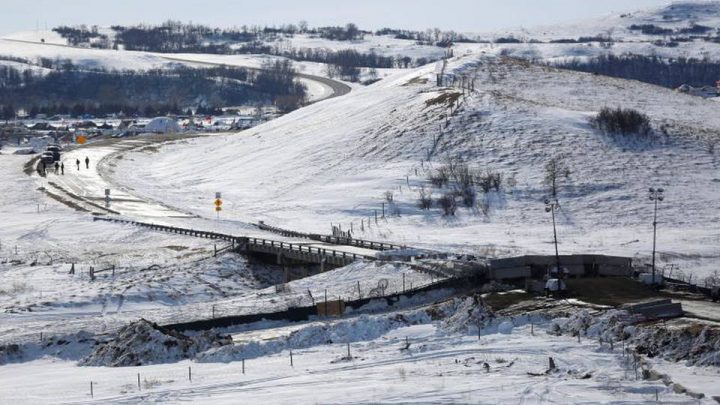The U.S. Army Corps of Engineers has announced it will greenlight the final phase of construction for the Dakota Access pipeline, prompting indigenous water protectors and their allies to call for a “last stand” against the $3.8 billion project. In a letter to Congress, acting Army Secretary Robert Speer said the Army Corps will cancel an environmental impact study of the Dakota Access pipeline and will grant an easement today allowing Energy Transfer Partners to drill under Lake Oahe on the Missouri River. The Army Corps also said it would suspend a customary 14-day waiting period following its order, meaning the company could immediately begin boring a tunnel for the final one-and-a-half miles of pipe.
The Standing Rock Sioux Tribe has promised a legal fight. Tribal Council Chair Dave Archambault II said in a statement, “As Native peoples, we have been knocked down again, but we will get back up, we will rise above the greed and corruption that has plagued our peoples since first contact. We call on the Native Nations of the United States to stand together, unite and fight back.”
Other indigenous water protectors and their allies have vowed to take direct action to stop construction at the drill pad on the west bank of the Missouri River, less than a mile north of the Standing Rock Reservation. Activists are also planning solidarity actions in cities across North America and beyond.
Meanwhile, The Seattle City Council has voted unanimously to divest $3 billion from Wells Fargo over the bank’s backing of the Dakota Access pipeline. The divestment legislation was first introduced by Socialist City Councilwoman Kshama Sawant in response to the demand issued by indigenous water protectors that individuals, cities and Native American nations cut ties with Wells Fargo and other banks that are investing in the pipeline. The Muckleshoot Tribe in Seattle, the Nez Perce Tribe in Idaho and the Mille Lacs Band of Ojibwe in Minnesota have all committed to divesting from Wells Fargo.










